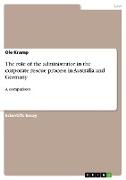- Start
- The role of the administrator in the corporate rescue process in Australia and Germany
The role of the administrator in the corporate rescue process in Australia and Germany
Angebote / Angebote:
Scientific Essay from the year 2008 in the subject Law - Comparative Legal Systems, Comparative Law, grade: High Distinction, The University of Adelaide, language: English, abstract: A Corporate rescueGenerally speaking, the corporate rescue process and the liquidation procedure form the two basic columns of a modern insolvency regime.(2) Whereas the Australian legislator expressly implemented these two procedures the German legislator codified a uniform insolvency process.An effective corporate rescue procedure is a cornerstone of a prospering economy. Economical value is closely connected to the risk of economic loss. Therefore, economic growth will only be sustainable if investments are supported by safeguards donated by effective insolvency regimes not only focussing on a fast liquidation but also on the reorganisation or rescue of a company. Only the careful balance of creditors' rights and the entrepreneurial spirit of the debtors ensure attractiveness for investments.(3) B Comparative approachThis essay is focussed on the administrator as point of comparison because his role in the process significantly reflects the principles of the underlying corporate rescue regime. In both countries Australia and Germany the administrator is a relatively influential organ. The essay will show that the role of the German administrator is much more influenced by the court than in Australia.The essay's goal is to examine selected issues concerning the Australian and German administrator. After presenting the different roles in the Australian and German corporate rescue process the essay will critically review the role of the administrator in both regimes in order to examine the effectiveness of the process from a comparative point of view.*********(2) See United Nations Commission on International Trade Law, Legislative Guide on Insolvency Law (2005) 14, recommendation 2.(3) United Nations Commission on International Trade Law, see above n 1, 11.
Folgt in ca. 5 Arbeitstagen
